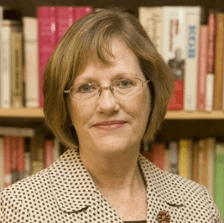Karen Dawisha facts for kids
Quick facts for kids
Karen Dawisha
|
|
|---|---|

Karen Dawisha in 2010
|
|
| Born | December 2, 1949 Colorado Springs, Colorado, U.S. |
| Died | April 11, 2018 (aged 68) Oxford, Ohio, U.S. |
| Occupation | Academic and author |
| Education | Lancaster University London School of Economics |
| Notable work | Putin's Kleptocracy |
| Spouse | Adeed Dawisha |
Karen Dawisha (born December 2, 1949 – died April 11, 2018) was an American expert in politics and a writer. She taught political science at Miami University in Oxford, Ohio. She also directed a center there that studied Russia and countries that used to be part of the Soviet Union.
Contents
Growing Up and Learning
Karen Hurst was born in Colorado on December 2, 1949. Her mom was a teacher, and her dad was a jazz pianist. She had three brothers and sisters. When she was in high school, Karen took a Russian language class. This made her very interested in Russia. She went to the University of Colorado Boulder and earned a degree in Russian politics. During her studies, she spent a year at Lancaster University in England, where she met her husband, Adeed Dawisha. Later, she earned her Ph.D. from the London School of Economics.
Her Work as an Expert
Karen Dawisha was an advisor to the British House of Commons Foreign Affairs Committee. This is like the UK's parliament. She also worked for the U.S. State Department from 1985 to 1987. Before 2000, she was a professor at the University of Maryland, College Park. There, she led a center that studied countries after communism. In 2014, Dawisha became well-known for her work about Vladimir Putin.
Putin's Kleptocracy
In 2014, Karen Dawisha wrote a book called Putin's Kleptocracy: Who Owns Russia?. People said it was like a list of important people who faced sanctions from America and Europe. The book tells the story of how Vladimir Putin became powerful in the 1990s. Dawisha showed how Putin's friends and co-workers from his early days gained a lot of wealth and power. Putin promised to control the very rich people, called oligarchs, when he was elected. But Dawisha wrote that Putin changed things. He made it so that these rich people worked for the state officials. These officials then gained economic control for the state and for themselves. Because of this, Dawisha said that 110 people control 35% of Russia's wealth. Many experts thought Russia was trying to become a democracy but was failing. However, Dawisha argued that Putin and his group wanted to create a strong government ruled by a small, close group. They used democracy only for show, not for real leadership.
Dawisha first wanted to publish Putin's Kleptocracy with Cambridge University Press (CUP). She had published five books with them before, and they first accepted this one. But then, CUP rejected her 500-page book. An editor said they were worried about legal risks. He wrote that the book's main idea was that Putin's power came from links to organized crime. Dawisha was upset. She said that a major publisher refused her book not because it wasn't good, but because the topic was "too hot to handle." She explained that she was not angry at CUP itself. Instead, she was upset about the situation in Britain that made publishers afraid of lawsuits. The Financial Times newspaper also pointed to the UK's strict libel laws, which make it easy to sue for false statements. Dawisha later took her book to Simon & Schuster in the U.S. In the U.S., the laws about libel (false statements) are less strict.
Her Books
Karen Dawisha wrote many important books about Russia and other countries. These include:
- Russia and the New States of Eurasia: The Politics of Upheaval (1994)
- Eastern Europe, Gorbachev and Reform: The Great Challenge (1989)
- The Kremlin and the Prague Spring (1984)
- The Soviet Union in the Middle East: Politics and Perspectives (1982)
- Soviet East-European Dilemmas: Coercion, Competition, and Consent (1981)
- Soviet Foreign Policy Toward Egypt (1979)
She also helped edit many other books. These books were part of a series about the politics of Eurasia. She also co-edited a four-volume series about how countries changed after communism.
Awards and Fellowships
Karen Dawisha received special awards and support from many important groups. These include the MacArthur Foundation and the Council on Foreign Relations. She was also given the Distinguished Research Professor prize by the University of Maryland. Many foundations and councils gave money to support her research projects.
Her Family Life
Karen Dawisha was married to Adeed Dawisha. He is also a professor at Miami University and studies politics in the Middle East. They had two children, Nadia and Emile, and one grandson. Both Karen and Adeed retired from their teaching jobs in 2016. Karen Dawisha passed away in April 2018 from lung cancer.
See also
 In Spanish: Karen Dawisha para niños
In Spanish: Karen Dawisha para niños
- Catherine Belton
 | George Robert Carruthers |
 | Patricia Bath |
 | Jan Ernst Matzeliger |
 | Alexander Miles |

